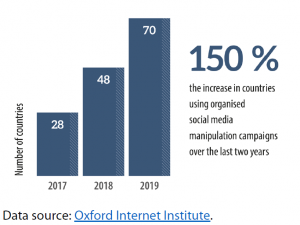Just as the ‘clickbait’ industry benefits financially from catching people’s attention, an increasing number of state actors benefit politically from the disintermediated infosphere by using computational propaganda techniques. These include AI-enabled illegal harvesting of data to profile and microtarget users, algorithms and automated ‘bot’ accounts, as well as human curation by cyber troops or ‘trolls’ to ‘purposefully distribute misleading information over social media networks’. Such activities can feed into coordinated campaigns of foreign state and non-state agents to influence democratic processes and political decision-making. In this context, disinformation turns one of democracy’s greatest assets — free and open debate — into a vulnerability. This affects most people across the world: Almost 60 % of the global population are active internet users.
A 2019 Oxford Internet Institute (OII) study found increasing social media manipulation by governments and political parties across the world. According to the OII, Facebook and Twitter found evidence of seven states – China, India, Iran, Pakistan, Russia, Saudi Arabia and Venezuela – engaging in information operations to influence foreign audiences in 2019, including via considerable cyber troop numbers. However, 10 times as many countries use such techniques to influence domestic audiences: In 2019, there was evidence of organised social media manipulation in 70 countries, compared to 48 countries in 2018, and 28 counties in 2017. According to the OII, 26 countries used computational propaganda domestically to control information, suppress fundamental human rights, discredit political opponents and overpower dissent.








Be the first to write a comment.